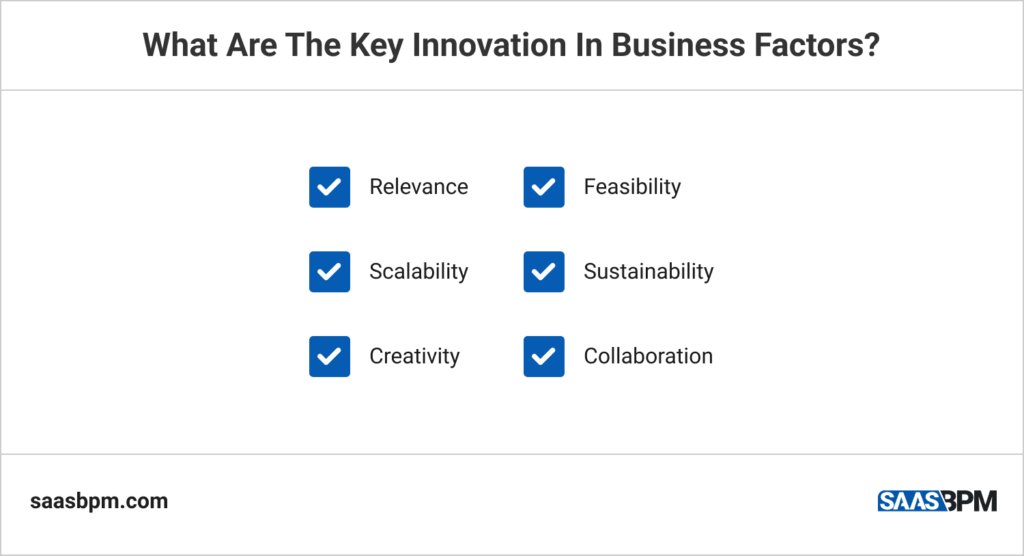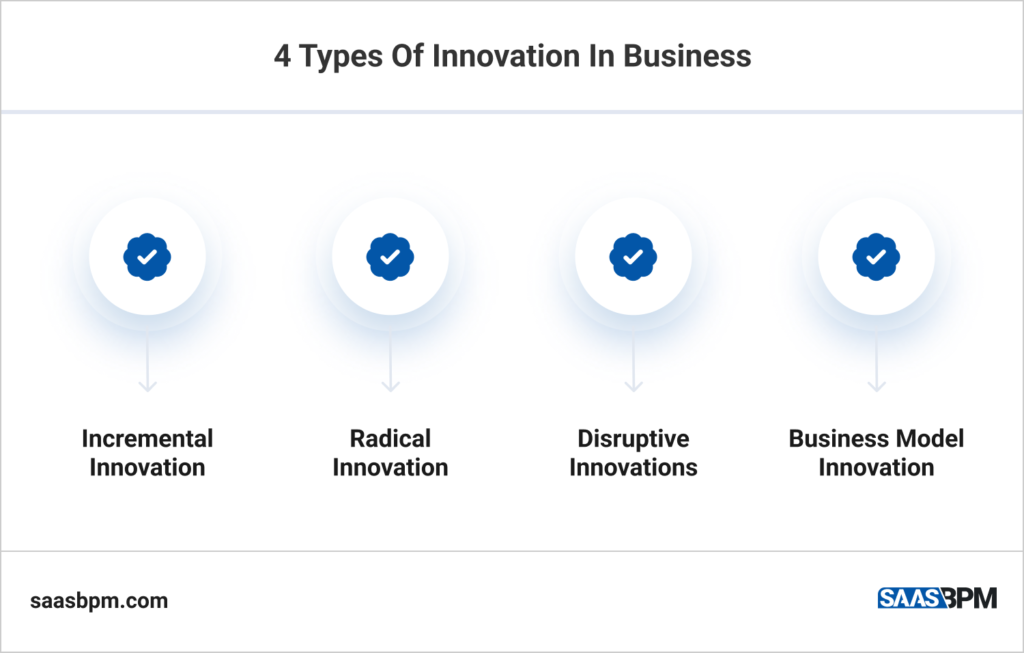Innovation in business is key to standing out in (and keeping up with) a competitive market. It doesn’t have to be a lottery-ticket idea that will start a revolution nor does it need to be expensive or scandalous. Introducing a new product and exploring new marketing channels are also types of innovation that can set your brand for success.
However, in the past few years, innovation in business was a concept that had been pushed aside by many companies. Having to operate with a tight budget and furloughing employees were some of the struggles of the pandemic, followed by economic and political uncertainty soon after it cooled down.
Many entrepreneurs resorted to business tech to better optimize internal processes. Although such process automation software tools had been around before, the spread of the remote work model and flexible contract-based gigs showed their high potential to improve productivity.
In this article, we will first define what innovation in business is and what are the factors that affect it. We will also outline the 4 main types your business can benefit from.
What Is Innovation In Business?

Innovation in business is all about discovering novel ways to create and deliver products or services that can provide an edge over the competition. It involves taking risks, embracing new ideas, and improving existing processes and technologies. Innovation helps businesses to stay ahead of the curve, increase profits and gain competitive advantage.
In order to achieve successful innovation in business, it is important for organisations to identify areas of improvement and focus on developing innovative solutions that can provide an advantage over competitors. This may involve investing in research and development teams or dedicating resources towards creating a corporate culture that encourages creative thinking.
Additionally, businesses should have systems and processes in place that will allow them to quickly develop, test, measure and refine their innovations as they go along.
The ultimate goal of innovation in business is to create products or services that are beneficial to both customers and the organization itself. By doing so, businesses can generate more revenue while also building customer loyalty through offering superior value propositions.
In order to ensure success with their innovations, organizations need to constantly monitor consumer trends to remain ahead of the competition.
What Are The Key Innovation In Business Factors?
Innovation in business is a complex process that requires multiple elements to come together for successful outcomes. Here are the six main ones:

Relevance
Relevance is a crucial factor when it comes to innovation in business. Businesses need to focus on providing solutions that are relevant to their customers’ needs and wants. This can be achieved by exploring current customer trends and understanding the demand for certain products or services. Also, businesses should also research competitors and identify areas where they can improve upon existing products or services to create unique offerings.
Feasibility
Feasibility is another important innovation element. Organizations must consider the costs of implementation as well as the resources required in order to bring an innovative solution successfully into the market. Additionally, businesses should also ensure that their proposed innovations are technically feasible from a practical standpoint before investing time and money into further development.
Scalability
Businesses must ensure that their innovations can be scaled up or down as needed to meet changing demands from customers over time. Moreover, scalability also plays a role when it comes to pricing strategies as organizations need to be able to adjust prices depending on supply and demand without causing any disruption within the organisation’s operations.
Sustainability
Sustainability is an important indicator of success when it comes to innovation in business endeavors. Sustainable solutions do not exploit natural resources but rather use them responsibly while minimizing environmental impact at the same time. Additionally, sustainability also includes considerations like ethical sourcing of materials and energy efficiency during production processes which are essential elements of any successful long-term innovation strategy.
Creativity
Creativity is key for successful innovation, as businesses must always be striving to create products or services that are unique and help differentiate them from their competitors. Furthermore, organizations should always be looking for ways to evolve their existing offerings by embracing new ideas, experimenting with different approaches, and rethinking established processes.
Collaboration
Collaboration is also a critical factor when it comes to innovation in business. Collaborative activities such as hackathons and think tanks can provide fresh perspectives which can lead to out-of-the-box thinking and creative solutions that may not have been possible without the input of multiple stakeholders.
In addition, collaborations between businesses from different industries or across various geographies can also bring forth ideas that lead to disruptive innovations. Don’t forget to implement a team collaboration tool such as SaaS BPM to nurture smooth communication and task management in your company.
4 Main Innovation Types And How Your Business Can Benefit
There are four main types of innovation that businesses can pursue: incremental, radical, disruptive and business model.

Incremental innovation is an ongoing process of improving existing products or services over time. It usually involves small modifications to increase efficiency or reduce costs. Businesses can benefit from incremental innovation by making their current offerings more efficient and cost-effective without significant investments.
Radical innovation occurs when organizations introduce completely new products or services into the market. It is often a more expensive and risky endeavor but has the potential to revolutionize industries and result in substantial financial rewards. Radical innovation can be, for example, launching new products or services that have the potential to capture large markets quickly and establish a strong competitive edge.
Disruptive innovations are those that threaten existing markets by introducing products or services that are significantly cheaper or better than what is currently available. Disruptive innovations occur when incumbents fail to recognize changes in customer preferences and technology advancements that allow for low-cost alternative solutions. Businesses can benefit from disruptive innovation by disrupting markets with their offerings before competitors can react accordingly.
Business model innovation refers to changing the way businesses operate in order to achieve improved results such as higher profits or increased efficiency. It involves rethinking traditional practices and leveraging different channels of distribution and production networks in order to gain competitive advantages over other companies operating in the same space. Businesses can benefit from business model innovation by developing new ways of working within their industry which allow them to gain competitive advantages over peers while increasing overall operating efficiencies at the same time.
Bottom Line
So there you have it, a simple guide to innovation in business. By keeping these key factors in mind, you can ensure that your business is constantly moving forward and staying relevant in today’s fast-paced marketplace. Innovation is all about thinking outside the box and being creative – so get out there and start brainstorming! And remember, always consult with experts before making any major changes to your business model.

